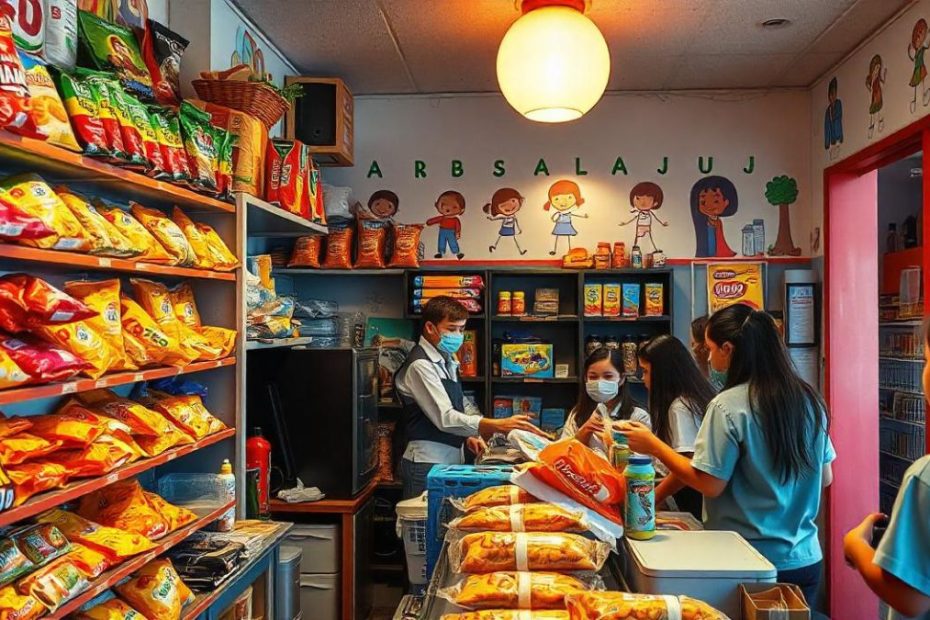In an effort to improve the health of students and combat high rates of childhood obesity, the government of Mexico, in collaboration with the Ministry of Public Education (SEP), announced an ambitious health program that will prohibit the sale of “junk food.” ” in schools starting in 2025. During the morning press conference ‘The Morning’ On October 21, the head of the SEP, Mario Delgado, announced the details of the initiative called “Healthy Living.”
The objective of this program is clear: reduce the consumption of ultra-processed foods and promote better eating habits in the student community. In Delgado’s words, this measure responds to the urgent need to reduce obesity rates in Mexico, which continues to be one of the main public health concerns in the country. The program will be directed under the supervision of the President of the Republic, Claudia Sheinbaum, and will come into force on March 29, 2025, applying to the 258,689 schools of the National Education System, covering all educational levels, from basic education to superior.
Comprehensive strategy to promote health in schools
The “Healthy Living” initiative aims to eliminate the presence of foods with low nutritional value in schools, betting on a comprehensive approach that includes changes in the preparation, distribution and sale of food in academic institutions. This also implies close collaboration between different government entities, such as the SEP, the Mexican Social Security Institute (IMSS) and the Institute of Security and Social Services of State Workers (ISSTE), to ensure that efforts have a sustained impact. in time.
One of the main drivers of this measure is concern about the high rates of obesity among the child and adolescent population.. According to the National Health and Nutrition Survey 2020-2023, it is estimated that 5.7 million children between 5 and 11 years old and 10.4 million adolescents between 12 and 19 years old have obesity problems. This problem has been exacerbated by the availability and consumption of ultra-processed foods, rich in sugars and saturated fats, added to the lack of physical activity and a sedentary lifestyle.
Delgado stressed that in previous administrations efforts had been made to combat the intake of processed products in schools, but these were not strong enough to generate significant results. He also made reference to the neoliberal period, criticizing how at that time the sale of these products was prioritized despite their negative effects on health. “In the neoliberal period they were not concerned about this situation, on the contrary, the sale of these products was promoted. There were campaigns against hunger, promoted by the same companies that produce junk food,” stated the head of the SEP.
Guidelines of the “Healthy Living” program
The “Healthy Living” program is made up of a series of general guidelines that seek to transform school environments into healthier and safer spaces for students. Highlights of this program include:
- Ban on the sale of ultra-processed foods: The sale of foods with low nutritional level will be restricted within school facilities, especially those with front labeling that indicates high sugar, sodium or fat content.
- Promotion of natural water consumption: The sale of sugary drinks in schools will be avoided, encouraging the consumption of natural water as the best hydration option for students.
- Training of school cooperative staff: The authorities and responsible staff of the cooperatives will receive training to prioritize the consumption of local and seasonal foods, ensuring a supply of healthy and fresh foods.
- Communication strategy: A communication strategy will be implemented aimed at different target audiences within the school community, with information adapted to promote better eating habits.
- Promotion of physical activity: The practice of physical and sports activities within schools will be encouraged as a fundamental measure to combat sedentary lifestyle.
- Diplomas and courses for teachers: Teachers will also be part of this initiative, receiving specialized training on nutrition and healthy lifestyles to better guide their students.
- Monitoring and evaluation: Continuous monitoring and a detailed evaluation of compliance with the established guidelines will be carried out to ensure the effectiveness of the program.
Student health is a national priority
The launch of “Healthy Living” represents a significant step for the Mexican government in its fight against childhood obesity. The initiative recognizes that the school environment plays a crucial role in forming healthy eating habits, and that drastic measures must be taken to change access to unhealthy products. This effort is also complemented by the promotion of physical activity, seeking a comprehensive approach that improves the quality of life of millions of children and adolescents.
The head of the SEP emphasized that “Healthy Living” is just the beginning of a profound change in the way the nutrition and well-being of students in Mexico is addressed. Constant monitoring of the impact of this initiative will be essential to measure its success and make the necessary adjustments that allow its continuity and strengthening.
